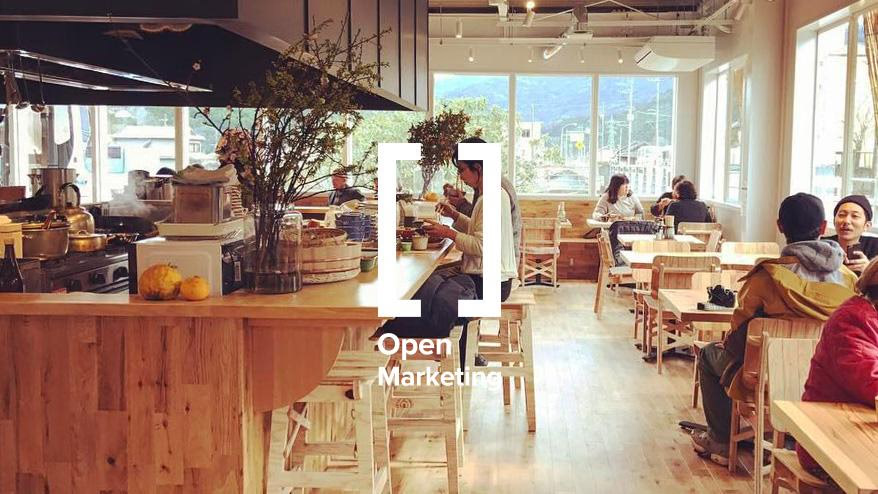みなさん、こんにちは。モノサス代表の林です。
この連載は私のスケジュールの都合で、いつもタイに出張している際に
書いているために、どうしても南国っぽい雰囲気に影響されてしまうのですが、
今回は、まだ冬真っ盛りの徳島県神山町で取り組んでいる
Food Hub Project を題材にして、 Open Marketing の考え方を
具体的に掘り下げてみたいと思います。
前回の記事では、 Open Marketing の実践のためには、
会社(チーム)の根幹に、
- 世の中(コミュニティ)がよりよくなるための社会的な課題に対して、
- 自らその必要性を説き、解決手段を提案し、
- それを顧客とともに実現することを目指している
という価値観があることが大切だとお伝えしました。
Food Hub Project は、モノサスが徳島県神山町で、神山町役場、神山つなぐ公社と
一緒に立ち上げた、神山の農業を次の世代につなぐための取り組みです。
今回の記事は Food Hub Project の取り組みを、 Open Marketing の観点から見たお話を
したいと思いますので、Food Hub Project の詳しい活動内容については、以前の記事を
ご一読いただけると幸いです。
お時間のない方のためにかいつまんでお話すると、
(神山における社会的な課題)
農業の担い手の不足のために耕作放棄地が増え、また新規就農者を増やそうにも
大量消費型の市場にあわせた営農では利益が薄く、生活の維持が難しい
(解決手段の提案)
町内の小規模の生産者と、町内の消費を結びつけるための、自社農園、食堂&パン屋、
食料雑貨店、加工品の開発・製造、テストキッチンの機能を備えた、「食のハブ」を
つくり、少量生産と少量消費をつなげ、循環させることで、農業従事者を支える
仕組みをつくる。
というのが Food Hub Project の取り組みです。
今回は特に、これらの取り組みを、どのようにして
顧客である神山の人々とともに実現していこうとしていくのか
についてお話したいと思います。
あらかじめお断りしておきたいのは、 Food Hub Project という会社は
まだ設立されてから1年足らずの会社であり、食堂やパン屋、食料雑貨店、
テストキッチンといったハブ機能を持った「かま屋」という複合施設は、
今週の3月3日(金)にオープンします。
Food Hub Project を通して、Open Marketing という考えをWeb 制作会社としてクライアントに提案するだけでなく、
自分たちなりに活動として実践していくチャレンジをしようとしているのです。
顧客の課題の解決を通して、社会課題を解決する。
Food Hub Project は超グローバルブランドではなく、
ローカルコミュニティに根ざしたものであることはいうまでもありません。
また、Food Hub Project が達成しようとしていることを一言で表すならば、
神山の農業を、神山の人たちに食べてもらうことで、次の世代につなげる
ということです。
一方で、地産地消( Food Hub Propject では地産地食と言っています)といった
地域内で経済循環を生み出すことが大事なことだとか、
耕作放棄地に人手がはいり、里山として手入れがされていけばよい、というようなことは
神山のみならず多少なりとも過疎の問題を抱える地域に縁のある人ならば、
誰しもがある程度肌身で感じていることではないでしょうか。
しかし、いざ自分と家族の生活の事を考えると、やはり地元の産品だけでは
著しく便が悪くなってしまう。
つまり、本音と建前がぶつかってしまうのです。
こういう時、人は必ずと言ってよいほど本音を優先します。
自らの生活の利便性や質を下げてまで、地域内のものを消費することを
優先する消費者はごく一部に限られます。
つまり、「地産地食に取り組んで、神山の農業を支え、農地を次の世代につなぐ」
という目的だけを主張しても、地域に住む人たちと共に課題を解決していくことは
難しいのではないかと思います。
私は、自らが課題だと感じている社会課題を顧客とともに解決するためには、
顧客自身の課題も同時に解決しなければならないと考えています。
さらにもう少し踏み込んだ言いかたをすると、
顧客の課題を解決することを通して、社会課題を解決する仕組みを構築する
ことが重要なのです。
例えば、エコが大切であるということは、共通認識にも近いものがあると思いますが、
だからと言って、経済合理性を著しく欠いた支出をエコに対してする人は
ほとんどいないのではないでしょうか。
普段エネルギーにかかっている支出に対する不満(=課題)を
解決する、ないしは、少なくとも同程度の不満に抑えることなしには、
顧客の同意を得ることは難しいのではないかと思います。
また、顧客側に課題が解決されるというメリットがないと、
原資がなくなるため、一時は賛同してくれたとしても、
継続的に協力関係を築くことが難しくなってしまうのです。
そういう視点で見た時に、神山に住む人びとが抱えている
食に関する課題はたくさんあります。
- 地域に根ざした食料品店や、野菜を売る道の駅などは存在するものの、まとまった買い物は、片道30分以上かけて買いにいかなければならない
- 神山には以前、薪窯で焼くパン屋が人気だったが、その店が閉店してからは地域内にパンを売る店がほとんどない
-
ランチを提供する店は数店あるものの、夜に開いている飲食店がほとんどなく、家族での外食、居酒屋で語り合うといった際の選択肢が極端に限られる
よりわかりやすい表現にすると
「より家の近くで充実した買い物がしたい」「美味しいパンを気軽に食べたい」
「家族で外食できる店が近所に欲しい」「近所の居酒屋で飲みたい」
といった悩みを神山に住む人びとは抱えてきたのです。
この悩みを解決したり、緩和することが、地産地食の取り組みになり、
神山の農業を支えることに重なってゆけばよいのだと考えています。
今日は概要を分析的にお話しましたが、次回は
実際のところこれから Food Hub Project が神山のみなさんと課題を共有し、
少しでもよい方向へ向かえるようにどんなことをしていこうとしているかを、
Open Marketing の視点からもう少しお話したいと思います。
P.S.
みなさま、四国や徳島にお越しの際は、ぜひ Food Hub Project が運営する
食堂「かま屋」と「かまパン&ストア」にお立ち寄りください。

